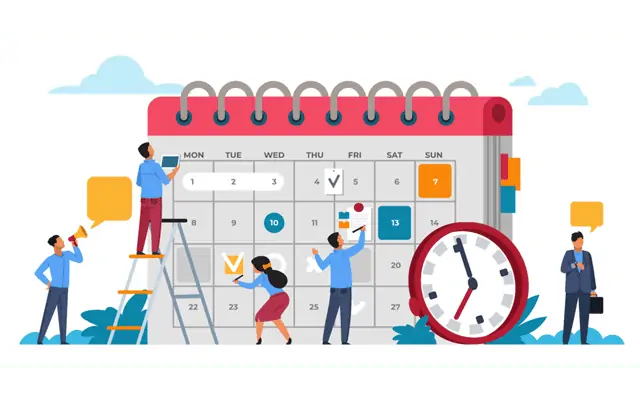
As with all excellent market research, a marketing calendar may help you keep track of acquiring, analyzing, and presenting quality data.
The calendar will also be necessary to indicate when to create content, start your subsequent campaign, and evaluate the outcomes.
Creating a calendar of intelligent, engaging marketing material is one excellent approach to ensure that your content is prepared and ready to go out into the world.
What is a Marketing Calendar?
A marketing calendar serves as a visual depiction of upcoming marketing initiatives and a central location for everyone participating in the process to check in, keep track of their duties, and monitor project progress.
You can use a printed calendar, create one on a whiteboard, or choose an electronic substitute that people can access from a distance and update or add information as needed. Your marketing calendar might serve as a roadmap for the coming months or the entire year.
A calendar provides a tactical overview that you can change as needed. Once finished, you’ll have more time to put your strategies into action to benefit your staff and clients.
Why do I need a Marketing Calendar?
A marketing calendar ensures you won’t overlook your marketing plans, budget, and strategies. Organizing your tasks can aid delegation, day planning, and task completion.
A marketing calendar is a fantastic tool for letting others know what is happening and what is being planned.
Your marketing calendar can address the following queries:
- Are there seasonal marketing campaigns?
- Are there marketing plans around holidays such as Christmas or Valentine’s Day?
- Do you have marketing campaigns based on sales, such as Black Friday?
- Are there quirky holidays or national days you want to focus on?
- Do you know of company announcements that need marketing or PR around them?
Possibly the most significant justification for using a marketing calendar is your deadlines. You can monitor the status of your marketing campaign and the individuals in charge of each stage.
How does a Marketing Calendar Work?

In that, you can enter significant dates (such as birthdays and anniversaries), schedule events, and arrange meetings — just like a regular calendar — a marketing calendar works similarly to a traditional calendar.
The calendar’s emphasis is on marketing initiatives and market research. There are various marketing calendars, which we’ll go into more detail about shortly. How you utilize your calendar will probably reflect its intended use.
Among the uses for your marketing calendar are:
- You can plan out daily social media updates.
- You can map out 6-week marketing strategies.
- You can input anniversary dates for your company or field to celebrate.
- You Can implement blog posts for the next 12 months
- and add birthdays to your calendar.
You can check in at the beginning of each month or week once you’ve decided on the calendar’s purpose and added dates, action items, and more.
For instance:
- You notice that your post on how Semrush may assist with SEO is due soon. Do you know any marketing professionals you could interview? You may call them and set up a meeting and conversation for an hour in two weeks. To remember the interview, you would add it to your calendar. You would also let your team know where you would be.
- You schedule time for studying and formulating interview questions in the days leading up to the interview. After the discussion, you plan to transpose the audio and take notes for the article.
- You assign someone to beta read and proofread your work and establish a deadline for finishing the first draft. The other party must accept this calendar invite for everything to be noted and posted.
- That person calls in sick the day before the beta read and substitutes another person for them. The calendar is revised.
You can see how having a centralized timeline and point of reference can benefit your organization.
Why is a Marketing Calendar Important to Your Store’s Success?
By keeping a marketing calendar, you can prevent content from getting lost in your hectic daily schedule and ensure that everyone on your marketing team is aware of what is being published and when. A marketing calendar also lets you view all of your material in one location, which helps you develop a more cohesive strategy and gives you a better sense of the big picture.
An excellent strategy to improve your site’s SEO and move up in search engine results is by publishing material to your store’s blog.
This is so that information that can be construed as a “response” to a browser’s inquiry can be found when search engines (like Google and Bing) crawl your website. Therefore, if a search engine discovers a pertinent blog on your website, it will give it a priority in the user’s browser and move your website closer to the top of the search results.
Another important strategy for attracting customers to your store is regularly publishing exciting adverts on your target market’s social media platforms. Eighty-eight percent of marketers surveyed reported that social media marketing boosted their exposure, and 61 percent claimed that this increased the number of devoted, returning consumers.
This is according to the 2021 Social Media Examiner Social Media Marketing Industry report. In other words, having a well-organized marketing schedule and plan ensures that your content is constantly executed and that you bring in more customers.
What should a marketing calendar include?
A marketing calendar should have the following components to help you stay focused on your marketing objectives:
- Project name: Try to keep the naming scheme simple. People need to be able to understand your points without having to look them up. Even the name can be color-coded to make it stand out and be simple to discover on the calendar.
- Members of the team: Who is in charge of this project? Each project has its staff, even if you have a marketing department. You can determine if the burden is too heavy by looking at who is on numerous teams and if there are several projects.
- The project’s launch date offers you a goal to work toward while you prepare. You may track and measure your campaign metrics based on the deadline.
- Tasks to finish: Give a list of them and an expected completion date. It is necessary to mention every job, regardless of size.
- Who is accountable for the task? Assign accountability for specific tasks. Team members can assist one another through this, and it can help you keep track of the workloads and completion times for your team.
- Observations on the campaign’s efficacy: Keeping campaign reports and notes synced with your calendar can be a good idea. Can review old campaigns to assess the project’s value.
Types of Marketing Calendars That Are Most Common

Use a calendar in various ways, and numerous calendar templates are available. The five most effective types of marketing calendars, together with a free template to get you started, have been compiled to make things simpler.
Marketing Calendar
This marketing calendar provides a broad overview of your forthcoming month, quarter, or year’s marketing plan. Any marketing you perform is covered, including social media marketing, digital marketing, content marketing, and more.
Additionally, it keeps track of any market research you conduct, including the results and presentations.
Marketing Campaign Calendar
A marketing campaign calendar, as opposed to a marketing calendar, is concentrated on a specific campaign. I will only use this calendar to record the tasks and team members required for a particular movement.
Better detail is possible with a focused focus since you can prepare everything from pre-campaign research to post-campaign analytics. Project management might become less frantic if you concentrate on media channels for only one project.
Avoid dividing your attention among too many tasks by concentrating all of your efforts on just one.
Email Marketing Calendar
This calendar can be helpful for campaigns involving subscriptions or electronic music. Can you use this calendar to schedule the sending of emails? You can also mention the stage each person is in on your target email list.
This calendar might help you remember to contact your list about special deals or breaking news.
Editorial Calendar
Planning blog articles and other editorial content is best done with an editorial calendar. A surefire strategy to improve your Google results is to update your website frequently with SEO-rich material, but you must be consistent.
The creation of content and the timing of its publication can be planned using an editorial calendar.
Editorial content can include:
- Blog posts
- Infographics
- Convention reports
- News and opinion
- White Papers
Different types of editorial material need varying levels of effort and expertise to produce. A calendar can display the amount of time required.
Producing a white paper with extensive research and interviews will probably take more time than writing a blog post with 1,000 words. Your editorial content calendar needs to reflect these factors and take them into account.
What transpires when your marketing calendar is effective?
The business works well with a calendar that satisfies your marketing requirements. A well-organized calendar may encourage you, help you meet deadlines, improve your SEO with regular content updates, and increase your sales through constant marketing, whether you are a sole proprietor or own your firm.
To keep your team accountable and on the same page while working on a marketing team, a good calendar will demonstrate task delegation, what is due, and when it is due.
Based on your ideas, a solid marketing calendar might generate further ones. If there are better periods of the year to run campaigns, it can also help reposition those campaigns.
In the end, a fantastic marketing calendar becomes an essential component of a well-functioning marketing machine. Running a larger organization is made more straightforward, and team members are empowered to know what role they perform, offer suggestions, track their efforts, and much more.
Conclusion
It might be simple to worry about what to say, when to promote, and how to spread your message, given the accelerating pace of the online world and media consumption.
Putting this information in a logical order can make you feel less stressed and offer you a significant advantage. Even while setting it up and getting it functioning could take some time and expertise, the payoff is unquestionably worthwhile.
Private Agent for Dropshipping Success